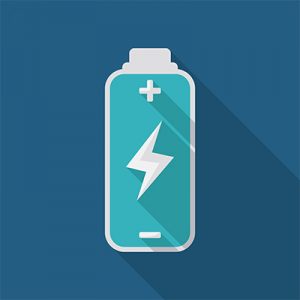 Canada is looking for its next big battery breakthrough!
Canada is looking for its next big battery breakthrough!
 The ECS Toyota Young Investigator Fellowship, a partnership between The Electrochemical Society and Toyota Research Institute of North America, a division of Toyota Motor North America, is in its fifth year. The fellowship aims to encourage young professors and scholars to pursue innovative electrochemical research in green energy technology. Through this fellowship, ECS and Toyota hope to see further innovative and unconventional technologies borne from electrochemical research.
The ECS Toyota Young Investigator Fellowship, a partnership between The Electrochemical Society and Toyota Research Institute of North America, a division of Toyota Motor North America, is in its fifth year. The fellowship aims to encourage young professors and scholars to pursue innovative electrochemical research in green energy technology. Through this fellowship, ECS and Toyota hope to see further innovative and unconventional technologies borne from electrochemical research.
The ECS Toyota Young Investigator Fellowship Selection Committee has chosen five recipients to receive the 2019-2020 fellowship awards for projects in green energy technology. (more…)
Call for Nominations: JES Technical Editor in Fuel Cells, Electrolyzers, and Energy Conversion
Posted on July 26, 2019 by Andrew Ryan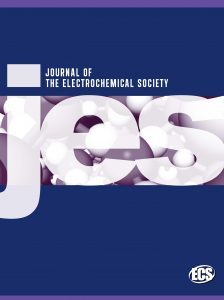 Deadline: September 13, 2019
Deadline: September 13, 2019
ECS is seeking to fill the position of technical editor in fuel cells, electrolyzers, and energy conversion for the Journal of The Electrochemical Society (JES).
Nominees for this position must possess and maintain scientific knowledge of the scope of the fuel cells, electrolyzers, and energy conversion topical interest area, which covers theoretical and experimental aspects of all types of fuel cells, electrolyzers, photovoltaics, and photoelectrochemistry. Specific topics as relates to energy conversion include design, modeling, testing, and evaluation; novel electrode structures and their characterization, including electrocatalytic materials and electrocatalysis; engineering aspects of fuel, electrochemical fuel synthesis, water, and thermal management. Materials at high temperatures are included.
The technical editor will be appointed for a minimum initial two-year term, renewable for additional terms, up to a maximum of 12 years total service in this role.
Call for Papers: Heterogeneous Functional Materials for Energy Conversion and Storage
Posted on July 25, 2019 by ECS Staff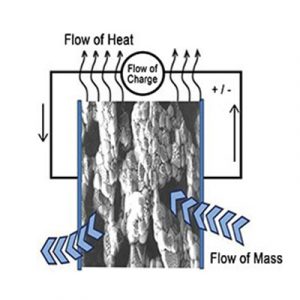 Submission Deadline: October 23, 2019
Submission Deadline: October 23, 2019
Submit your manuscripts to the Journal of The Electrochemical Society Focus Issue on Heterogeneous Functional Materials for Energy Conversion and Storage.
About the focus issue
This special issue focuses on Heterogeneous Functional Materials (HeteroFoaMs), which are pervasive in electrochemical devices. These devices consist of multiple materials combined at multiple scales (from atomic to macro) that actively interact during their functional history in a manner that controls their collective performance as a system at the global level. The principal motivation for this special issue will be to provide a forum to discuss the science that controls emergent properties in heterogeneous functional materials as a foundation for design of functional material devices with performance not bounded by constituent properties.
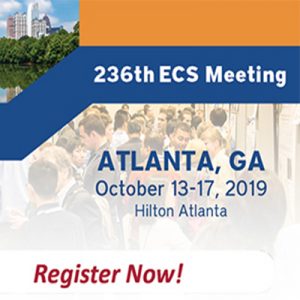 Top 6 reasons to attend the 236th ECS Meeting:
Top 6 reasons to attend the 236th ECS Meeting:
1. Technical Program: Our large technical program of over 2,400 talks in 52 symposia, along with countless division, social, and networking events across 5 days!
2. Networking: No social media platform or digital introduction will ever have an advantage over being in the same location as 2,400 of your colleagues.
3. Educational Opportunities: From all-day short courses to professional development appointments, ECS is sure to have something to offer you. (more…)
Now Hiring: Publications Specialist/Interface Production Editor
Posted on July 25, 2019 by ECS Staff ECS seeks publications specialist/Interface production editor
ECS seeks publications specialist/Interface production editor
Reports to: Director of Publications
Classification: Full Time Exempt
MAJOR FUNCTION
Responsible for the production and dissemination of Interface consistent with ECS goals, objectives, and policies. Provides assistance in the management of ECS publications by performing various duties related to journals/ECST production and data collection and analysis, specifically with respect to publications usage statistics. (more…)
John Goodenough: Royal Society’s Newest Copley Medal Recipient
Posted on July 24, 2019 by Jennifer Quartararo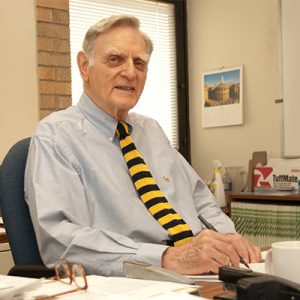 John Bannister Goodenough, internationally recognized as one of the key minds behind the development of the first commercial lithium-ion battery, has been awarded the Royal Society’s Copley Medal, the world’s oldest scientific prize.
John Bannister Goodenough, internationally recognized as one of the key minds behind the development of the first commercial lithium-ion battery, has been awarded the Royal Society’s Copley Medal, the world’s oldest scientific prize.
The longtime ECS fellow and honorary member was recognized for his exceptional contributions to the materials science field, still used in mobile electronics today, including laptops and smartphones all around the world. The award ties him to an elite group of equally notable scientists and engineers, including the likes of Benjamin Franklin, Charles Darwin, Louis Pasteur, Albert Einstein, and Dorothy Hodgkin.
“Words are not sufficient to express my appreciation for this award,” said Goodenough, in a Royal Society interview. “My ten years at Oxford were transformative for me, and I thank especially those who had the imagination to invite a U.S. non-academic physicist to come to England to be a Professor and Head of the Oxford Inorganic Chemistry Laboratory. I regret that age and a bad leg prevent my travel back to England to celebrate such a wonderful surprise.”
Call for Papers: Mathematical Modeling of Electrochemical Systems at Multiple Scales in Honor of Richard Alkire
Posted on July 24, 2019 by ECS Staff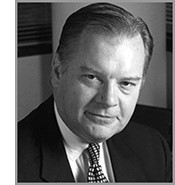 Submission Deadline: September 30, 2019
Submission Deadline: September 30, 2019
Submit your manuscripts to the Journal of The Electrochemical Society Focus Issue on Mathematical Modeling of Electrochemical Systems at Multiple Scales in Honor of Richard Alkire.
About the focus issue
This focus issue of the Journal of The Electrochemical Society is devoted to the mathematical modeling of electrochemical systems across multiple scales. Advances in electrochemical systems will be greatly influenced by the use of advanced simulation tools for the design and control of materials and processes. The figure below illustrates some of the computational methods that have been developed to deal with phenomena at different time and length scales, ranging from atomic to macro, in order to compute properties and model phenomena. This issue is inspired by the work of Professor Richard Alkire from the University of Illinois-Urbana Champaign, who has been a pioneer in the multiscale modeling of electrochemical systems. In addition, Professor Alkire has led the community in establishing a vision for such work and has trained and influenced countless researchers on this topic over the years. The issue will be dedicated to him in recognition of his contributions to this field. (more…)
 ECS’s mission is to advance theory and practice at the forefront of electrochemical and solid state science and technology, and allied subjects by encouraging research, discussion, critical assessment, and dissemination of knowledge in these fields. We couldn’t do this without the help of our sponsors! Their support plays a key role in the advancement of the sciences.
ECS’s mission is to advance theory and practice at the forefront of electrochemical and solid state science and technology, and allied subjects by encouraging research, discussion, critical assessment, and dissemination of knowledge in these fields. We couldn’t do this without the help of our sponsors! Their support plays a key role in the advancement of the sciences.
Most recently, the Army Research Office, an element of the U.S. Army Combat Capabilities Development Command’s Army Research Laboratory, contributed $5,000 to the 19th Polymer Electrolyte Fuel Cells & Electrolyzers 19 (PEFC&E-19) symposium taking place at the 236th ECS Meeting. (more…)
 ECS Montréal with IMCS 2020 abstract submission is open
ECS Montréal with IMCS 2020 abstract submission is open
Join us as the 237th ECS Meeting and the 18th International Meeting on Chemical Sensors (IMCS 2020) comes to the Palais des Congres de Montréal in Montréal, Canada from May 10-14, 2020. This is a can’t miss event for electrochemists and solid state scientists, featuring over 50 symposia in the following areas:

